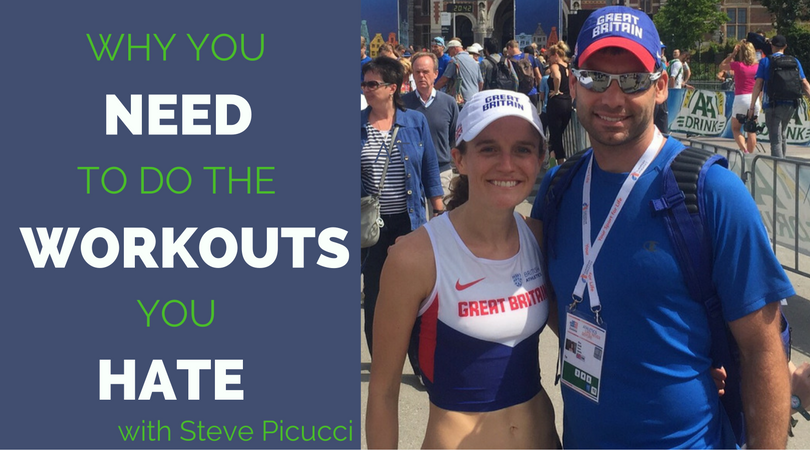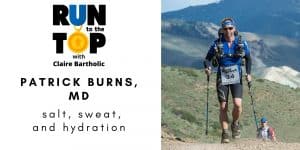Not many runners are able to have their spouses act as their coaches, but as you may know, my husband and I are an exception to that rule.
Today we’re talking to Steve Picucci, who is the head cross-country and track and field coach at Moorehead State University in Kentucky. He also happens to be my husband, and he coaches me as well.

Steve has an innate ability to understand what each individual runner needs when it matters. This is part of what makes him such a great coach. Here are some of the topics we’ll discuss today:
- What high school athletes should be thinking about as they begin the college search.
- Why having a coach is important and what to look for when searching for one.
- What it’s like to be your spouse’s coach.
- Example of workouts that runners of all sorts can follow.
- Why time off is important.
- Steve’s favorite book, the best advice he’s ever received, and his favorite piece of running equipment in the Final Kick round.
Questions Steve is asked:
4:30: Tell us a bit about your history as a runner and coach.
5:40: What made you decide to switch to coaching as a career?
7:55: Would you say that being a volunteer coach first is the best way to do it?
9:00: What does being a collegiate coach involve?
10:30: Can you explain how big the recruiting process is?
12:25: What is your advice for high school athletes looking at schools?
13:40: What is your advice for someone looking for their first running coach?
14:55: What is your favorite thing about coaching?
15:55: How important is it to have a coach?
18:10: Why do you think it works for us to be husband and wife, as well as you being my coach?
19:15: Can you share funny things about me?
20:40: What’s the most difficult part of coaching your wife?
22:30: Do you ever feel that it’s a benefit that I’m your wife?
25:10: Why do most people need the structure of a coaching program?
27:40: What’s the biggest mistake most people make when training themselves?
29:00: What should 800 or mile people focus on?
34:00: How often should people do strides and why are they important?
35:55: What are some key workouts for a 5K or 10K runner?
39:50: How can someone know what their biggest strength is?
42:15: Why does a marathon need to work on sprints and speed segments?
45:00: Would you say that everyone needs to get back to doing faster stuff?
45:50: Why is time off in between segments important?
49:00: What are some key things marathoners need to keep in mind?
56:15: What if someone wants you to be their coach? Do you have time for that?
58:20: What do you see yourself doing eventually?
Quotes by Steve:
“I didn’t know that [coaching] was really what I wanted to do until I started full-time interim coaching as the head coach that year.”
“It’s really hard to get into college coaching. If I wasn’t in the right place at the right time, I probably wouldn’t have been offered the full-time position.”
“Just because a kid runs fast doesn’t mean that they’re a good fit for your program.”
“If you’re just getting started, you can learn a lot be reading a few books and just focusing on the basics…. Just keep it simple. Read a few books and then you can slowly figure out what kind of coach would work better for you.”
“For me, [Tina and I] don’t need to talk about running 24 hours per day.”
“[Tina is] a really open book. The blog and podcast are very open and honest.”
“For 5K or 10K, you need to keep your strength up.”
“People tend to do too much too soon…. They’re going too hard all the time and not letting the workout help them progress.”
“What works for you might not work for everyone.”
“You can’t neglect the speed part of running. Most marathoners will tell you that some days you’re just struggling to get through it. Running faster will help you feel more efficient.”
“Taking breaks helps you progress…. Everyone needs to take a break to recover.”
“You have to have different types of workouts, whether you’re running an 800 or a marathon.”
“Take your easy days easy and your hard days hard.”
Take a Listen on Your Next Run
Want more awesome interviews and advice?
Subscribe to our iTunes channel
Links:
Last week’s episode with Todd Williams
EnduroPacks Electrolyte Spray (remember to use coupon code TINAMUIR for 10% off)
We really hope you’ve enjoyed this episode of Run to the Top.
The best way you can show your support of the show is to share this podcast with your family and friends and share it on your Facebook, Twitter, or any other social media channel you use.
If more people who know about the podcast and download the episodes, it means I can reach out to and get through to the top running influencers, to bring them on and share their advice, which hopefully makes the show even more enjoyable for you!
Finally, if you have been listening for a while, and you have a few few moments, would you be able to
review the podcast on iTunes
to help Run to the Top move up the rankings. My goal is to make this the best running podcast out there, and this helps tremendously.
You can follow this YouTube Video of a Demonstration of How to Leave a Review from a Desktop.
If you would like to review from your mobile device:
- Go onto the podcast app
- Search for the Runners Connect podcast in the search bar (bottom right)
- Select the podcast
- There will be 3 tabs, the middle one says Reviews, click that
- It will say “Write a Review”
Thank you SO much!
I appreciate you tuning in. Remember you can always email me tina@runnersconnect.net if you have any suggestions, feedback, or guests you would like to hear from.
Next week, we will be talking with Pete McGill, the author of
Born Again Runner.
He has a lot to say, and I hope you’ll join me for next week’s episode.








